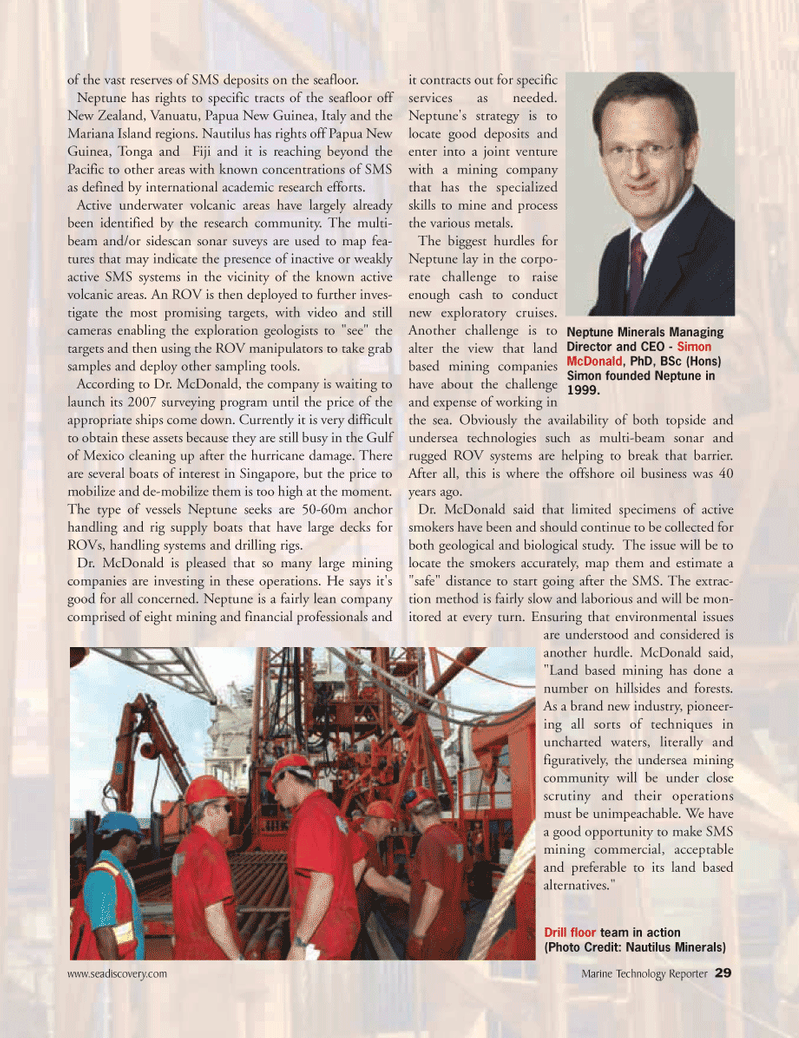
Page 29: of Marine Technology Magazine (January 2007)
Seafloor Engineering
Read this page in Pdf, Flash or Html5 edition of January 2007 Marine Technology Magazine
www.seadiscovery.com Marine Technology Reporter 29 of the vast reserves of SMS deposits on the seafloor.
Neptune has rights to specific tracts of the seafloor off
New Zealand, Vanuatu, Papua New Guinea, Italy and the
Mariana Island regions. Nautilus has rights off Papua New
Guinea, Tonga and Fiji and it is reaching beyond the
Pacific to other areas with known concentrations of SMS as defined by international academic research efforts.
Active underwater volcanic areas have largely already been identified by the research community. The multi- beam and/or sidescan sonar suveys are used to map fea- tures that may indicate the presence of inactive or weakly active SMS systems in the vicinity of the known active volcanic areas. An ROV is then deployed to further inves- tigate the most promising targets, with video and still cameras enabling the exploration geologists to "see" the targets and then using the ROV manipulators to take grab samples and deploy other sampling tools.
According to Dr. McDonald, the company is waiting to launch its 2007 surveying program until the price of the appropriate ships come down. Currently it is very difficult to obtain these assets because they are still busy in the Gulf of Mexico cleaning up after the hurricane damage. There are several boats of interest in Singapore, but the price to mobilize and de-mobilize them is too high at the moment.
The type of vessels Neptune seeks are 50-60m anchor handling and rig supply boats that have large decks for
ROVs, handling systems and drilling rigs.
Dr. McDonald is pleased that so many large mining companies are investing in these operations. He says it's good for all concerned. Neptune is a fairly lean company comprised of eight mining and financial professionals and it contracts out for specific services as needed.
Neptune's strategy is to locate good deposits and enter into a joint venture with a mining company that has the specialized skills to mine and process the various metals.
The biggest hurdles for
Neptune lay in the corpo- rate challenge to raise enough cash to conduct new exploratory cruises.
Another challenge is to alter the view that land based mining companies have about the challenge and expense of working in the sea. Obviously the availability of both topside and undersea technologies such as multi-beam sonar and rugged ROV systems are helping to break that barrier.
After all, this is where the offshore oil business was 40 years ago.
Dr. McDonald said that limited specimens of active smokers have been and should continue to be collected for both geological and biological study. The issue will be to locate the smokers accurately, map them and estimate a "safe" distance to start going after the SMS. The extrac- tion method is fairly slow and laborious and will be mon- itored at every turn. Ensuring that environmental issues are understood and considered is another hurdle. McDonald said, "Land based mining has done a number on hillsides and forests.
As a brand new industry, pioneer- ing all sorts of techniques in uncharted waters, literally and figuratively, the undersea mining community will be under close scrutiny and their operations must be unimpeachable. We have a good opportunity to make SMS mining commercial, acceptable and preferable to its land based alternatives."
Neptune Minerals Managing
Director and CEO - Simon
McDonald, PhD, BSc (Hons)
Simon founded Neptune in 1999.
Drill floor team in action (Photo Credit: Nautilus Minerals)
MTR#1 (17-32).qxd 1/11/2007 4:05 PM Page 29

 28
28

 30
30
